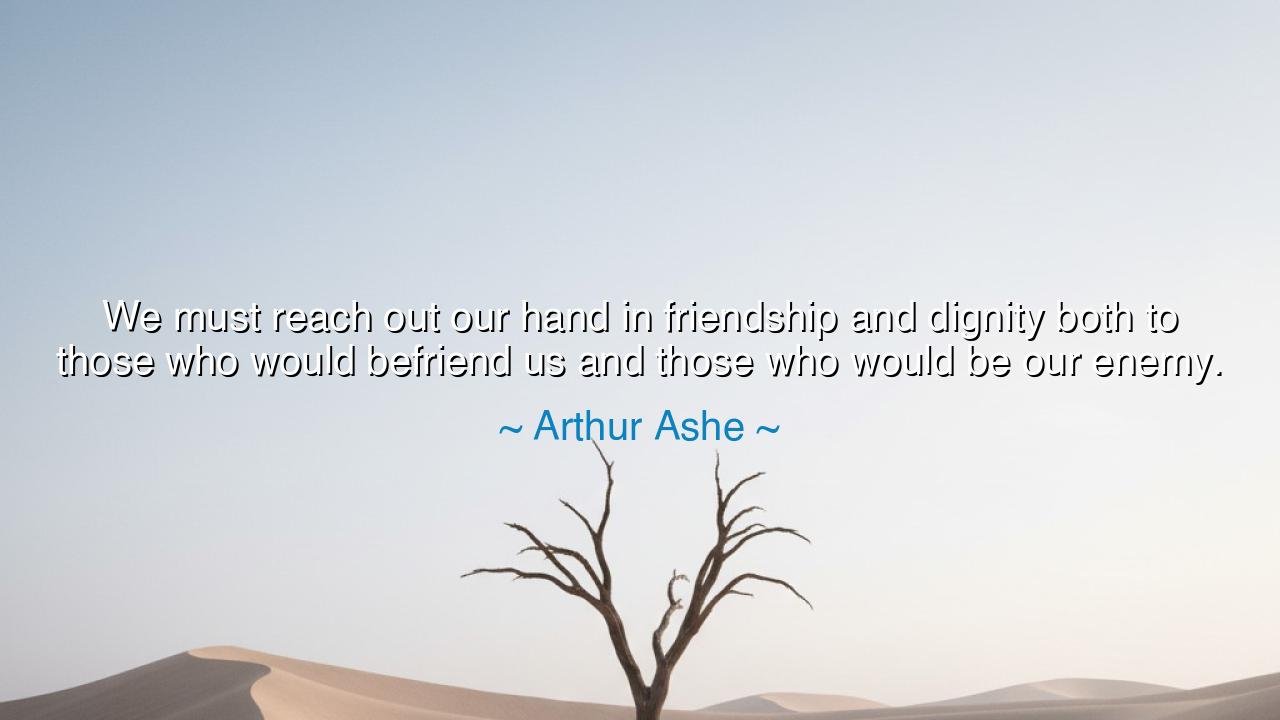
We must reach out our hand in friendship and dignity both to
We must reach out our hand in friendship and dignity both to those who would befriend us and those who would be our enemy.






“We must reach out our hand in friendship and dignity both to those who would befriend us and those who would be our enemy.” Thus spoke Arthur Ashe, the noble athlete and humanitarian whose words rose beyond the tennis court and into the realm of eternal wisdom. In this single sentence, Ashe distills the highest calling of the human spirit: to extend friendship not only toward those who welcome it, but also toward those who reject or oppose it. For true greatness is not measured by victory over others, but by mastery over oneself—by the courage to meet hatred with dignity, and opposition with grace. His words are both a challenge and a promise: that peace, whether between nations or hearts, begins with the outstretched hand.
The origin of these words lies in the life of a man who faced struggle with quiet strength. Arthur Ashe, the first Black man to win the men’s singles title at Wimbledon, lived at a time when racial prejudice and injustice shadowed even the brightest achievements. Yet he never allowed bitterness to rule his heart. He understood that change is not born from anger alone, but from understanding, and that the only weapon more powerful than hatred is compassion. His philosophy was not one of surrender, but of courage—the courage to stand tall, to preserve one’s dignity in the face of insult, and to respond to hostility with humanity.
When Ashe calls us to “reach out our hand,” he summons the ancient virtue of magnanimity—the greatness of soul that rises above vengeance. To offer friendship to a friend is easy; to offer it to an enemy is divine. Such a gesture does not weaken us—it strengthens us, for it declares that we are governed not by wrath, but by wisdom. The dignity Ashe speaks of is not pride or stubbornness, but the calm assurance that comes from knowing one’s worth. It is the shield of the righteous heart, protecting compassion from corruption. To act with dignity is to affirm that hatred shall not define us, and that even in the face of cruelty, we will remain whole.
History bears witness to this truth. Consider Abraham Lincoln, who during the American Civil War bore no malice toward his enemies. In his second inaugural address, delivered while the nation still bled, he spoke not of punishment but of healing: “With malice toward none, with charity for all…” Like Ashe, Lincoln knew that peace cannot be forced by violence, only by reconciliation. His open hand, offered even to those who sought his destruction, became a symbol of moral strength—the kind that triumphs not through conquest, but through compassion. Such leaders, rare in every age, remind us that to forgive is not to forget, but to choose a higher path.
To live by Ashe’s words demands courage of a different kind—the inner courage to love where others hate, to forgive where others scorn, and to hope where others despair. This is not weakness, but the deepest strength. For the hand extended in friendship may be rejected, but the act itself transforms the giver. It breaks the cycle of enmity, if not in the world, then within the heart. And though the enemy may remain unchanged, the one who offers friendship grows wiser, freer, and more humane. As the ancient Stoics taught, we cannot control the hearts of others, but we can govern our own. To do so with grace is to walk the path of the truly noble.
Ashe’s call to action reaches far beyond politics or sport—it touches the realm of the everyday. Each of us, in our smaller battles, faces moments of choice: whether to meet insult with retaliation, or to answer it with peace. To “reach out our hand” may mean offering forgiveness to one who has wronged us, listening to one we disagree with, or showing kindness where it is undeserved. Such acts, though simple, are the foundations of a better world. Every gesture of dignity weakens the power of hatred, and every act of friendship plants a seed of understanding that may one day bear fruit.
Let this, then, be the lesson: that the measure of one’s greatness is not in how one treats one’s allies, but one’s enemies. To live with dignity is to refuse to be diminished by hostility. To live with friendship is to see the shared humanity even in those who oppose us. And though the road of reconciliation is long and hard, it is the only road that leads toward peace.
In the end, Arthur Ashe’s wisdom stands as both a moral compass and a timeless challenge: that in a world too often divided by fear and anger, the most heroic act is the simplest one—to extend the open hand instead of the clenched fist. For when we do, we affirm the highest truth of all—that the human heart, guided by courage and compassion, is stronger than any enmity, and that peace and friendship, offered in dignity, remain the only lasting victories worthy of mankind.






AAdministratorAdministrator
Welcome, honored guests. Please leave a comment, we will respond soon